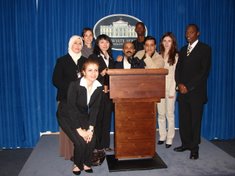Thousands of people who had to crash at places other than theirs for the curfew clamped on the capital and five other divisional headquarters Wednesday night hurried to go home after the government relaxed the restriction for three hours from 4:00pm yesterday.
Desperate for the safety back home, they however suffered badly due to severe transport crisis.
Patients faced tremendous sufferings, as no vehicles plied the city streets, medical employees failed to attend their duties and the pharmacists, with or without the knowledge of the curfew, kept their stores closed.
Emergency patients from districts outside Dhaka who had no knowledge of the city were stuck at various entry points for hours, while patients from within the metropolis either were forced to pay a few times high fares for transports or had to wait for many hours.
Meanwhile, the city dwellers flocked to the markets to make sure they have enough provisions for the days to come, but found most of the malls, department stores, and kitchen markets shuttered.
Buses, auto-rickshaws and other vehicles including rickshaws charged more than twice the usual fare. Still, people moved in thousands towards the bus terminals, railway stations and launch terminals in whatever way they could. Many set off on foot, shouldering the luggage.
Since the curfew was imposed on Wednesday night, fourteen journalists from the daily

Samakal were also reportedly beaten up, arrested and taken to Mohammadpur and Mirpur police stations.
Mirpur police filed a case against one of the journalists and sent him to court yesterday.
Two journalists from Ajker Kagoj, two from Jai Jai Din, two from Bangladesh Today, daily Amar Desh reporter Nesar Ahmed, daily Korotoa reporter Sabbir Mahmud, Jahangir Alam of UNB, Dinkal photographer Babul Talukder, and reporters Wahiduzzaman and Fariduddin Ahmed were allegedly assaulted yesterday by the law enforcers while covering the curfew.
On Wednesday night, several journalists were reportedly beaten up and a number of them arrested while they were headed for home during the curfew.

Anis Alamgir, news chief of Bashakhi TV, was among many of the injured senior journalists who were beaten up.
Twelve of the arrested journalists have been released, according to the police.Anis Alamgir, head of news at private TV station Baishakhi, was arrested while returning home on Wednesday night. He was taken to Mohammadpur Police Station where he was severely beaten up by law enforcers.
Alamgir received multiple injuries to his legs and arms.
Three bdnews24.com reporters -- Liton Haider, Biplob Rahman and Rommo -- were arrested by the law enforcers as they were returning home from work, despite showing their press identity cards.
Expressing deep concern over harassment of journalists, Bangladesh journalists associations requested the authorities to take steps so that no journalists are subjected to any harassment in discharging their professional duties.
It may be mentioned that Information Advisor had assured the editors that press ID would be recognized as curfew passes which was repeatedly confirmed by Press Information Department last night.
The Daily Star photo: (top) People scramble to board a train at Airport Railway Station Thursday as curfew was relaxed for three hours from 4:00pm, (middle) A sick woman being taken to hospital on a rickshaw as her attendant holds the saline bag. The photo was taken from Malibagh during curfew hours, (bottom) Farmgate, one of the busiest spots in Dhaka, gave a deserted look during curfew hours.
 Law enforcement agency personnel assaulted a number of journalists including The Daily Star's Dhaka University (DU) correspondent since the curfew was imposed on Wednesday night.
Law enforcement agency personnel assaulted a number of journalists including The Daily Star's Dhaka University (DU) correspondent since the curfew was imposed on Wednesday night. Samakal were also reportedly beaten up, arrested and taken to Mohammadpur and Mirpur police stations.
Samakal were also reportedly beaten up, arrested and taken to Mohammadpur and Mirpur police stations.  Anis Alamgir, news chief of Bashakhi TV, was among many of the injured senior journalists who were beaten up.
Anis Alamgir, news chief of Bashakhi TV, was among many of the injured senior journalists who were beaten up. 











